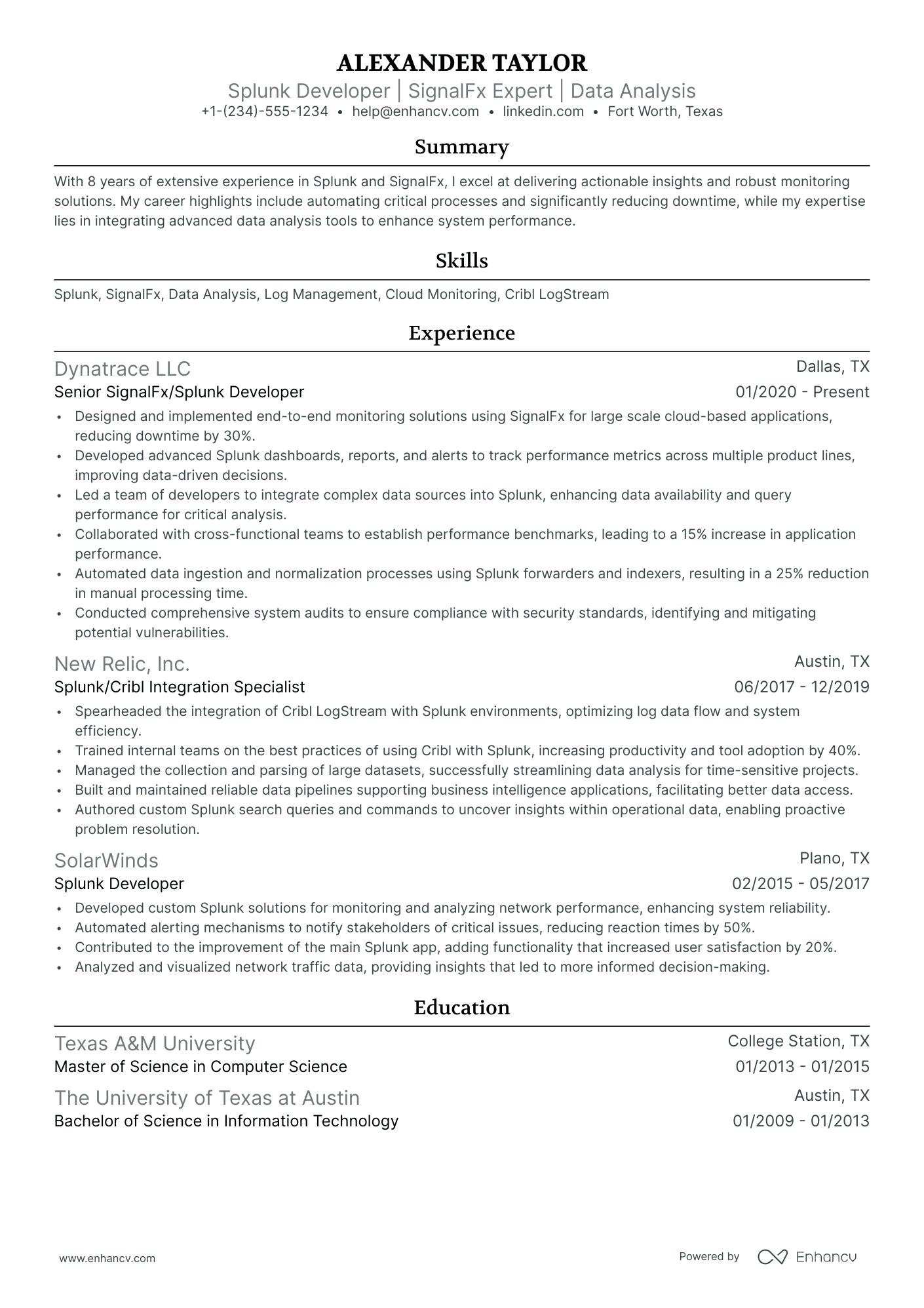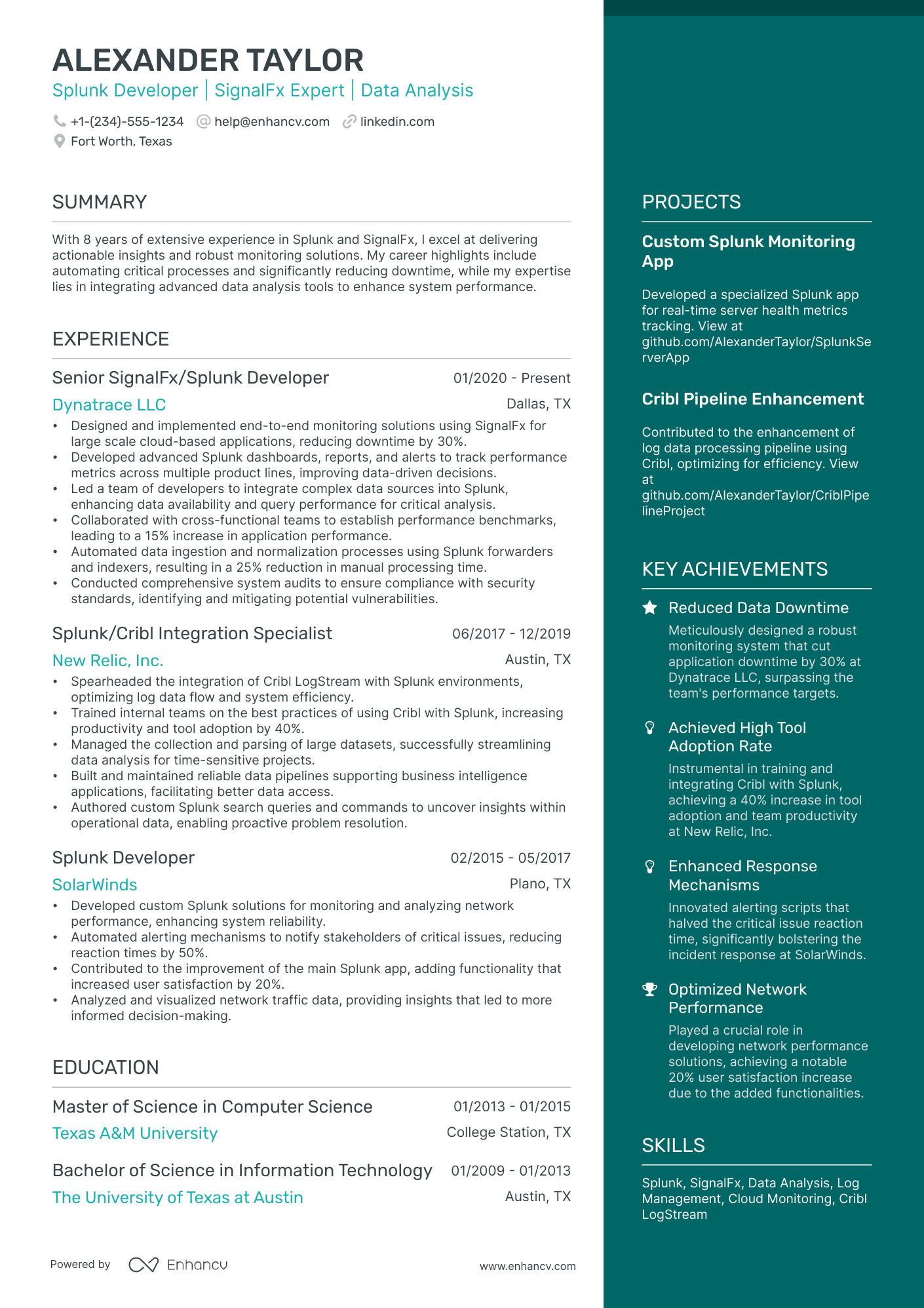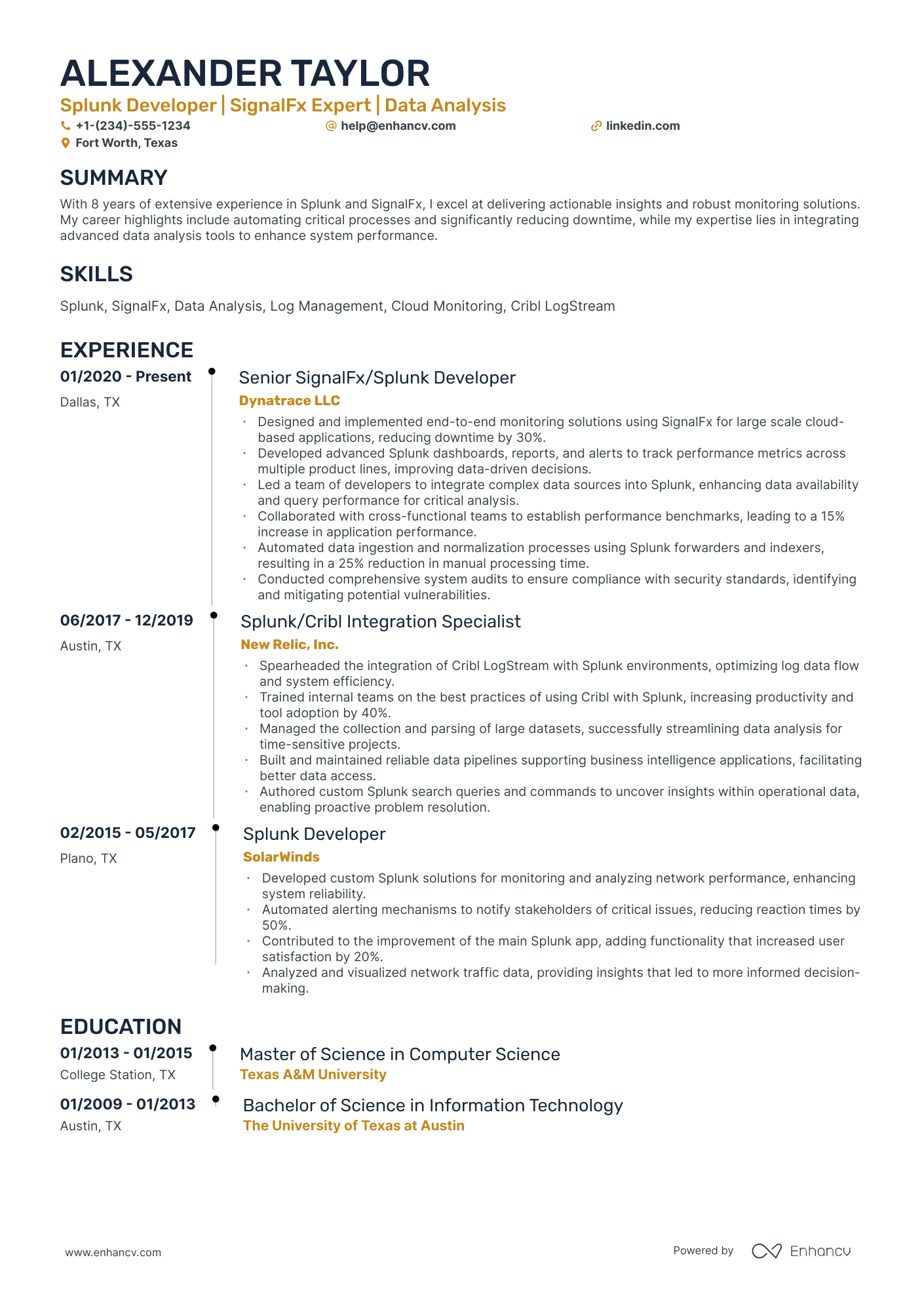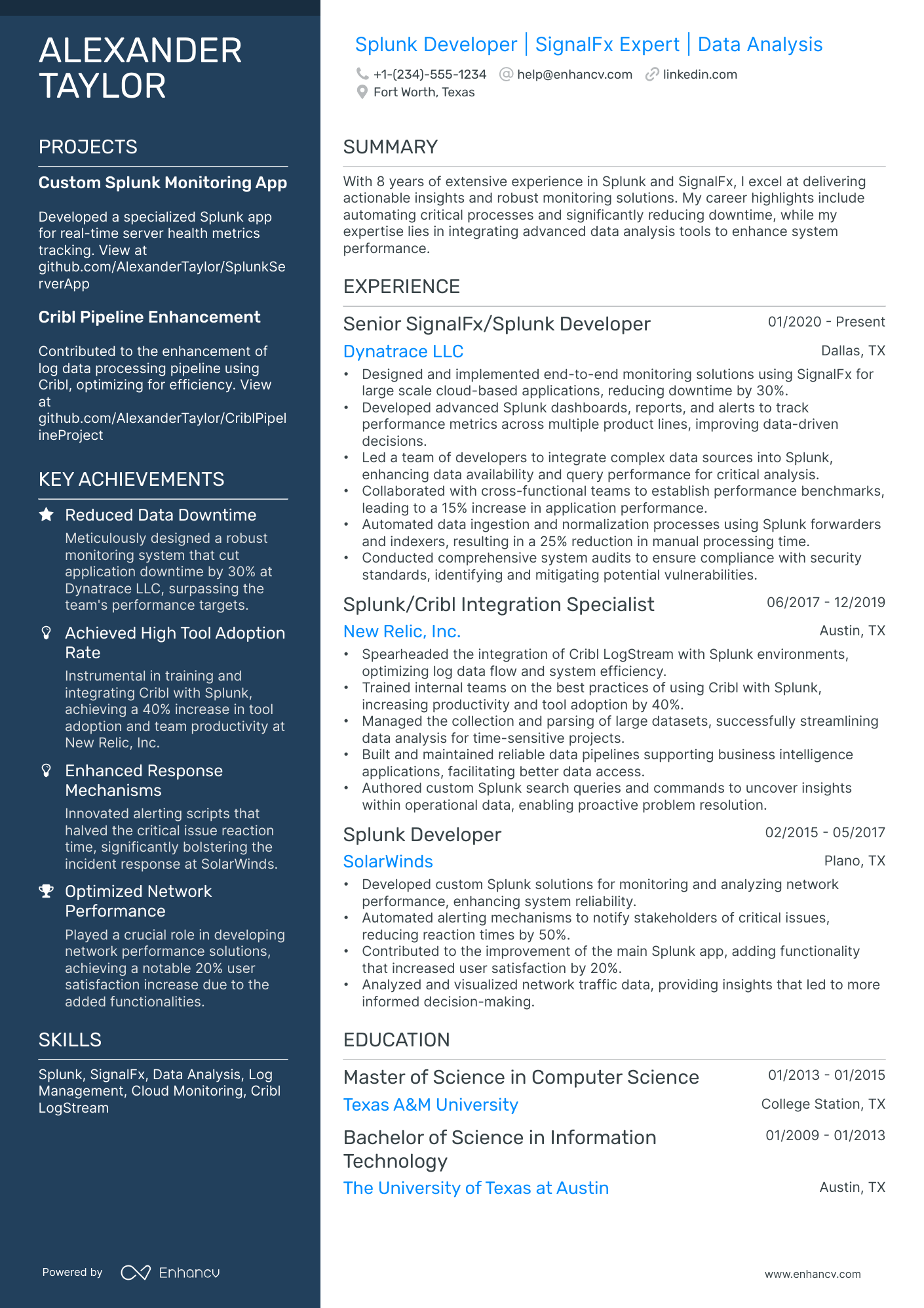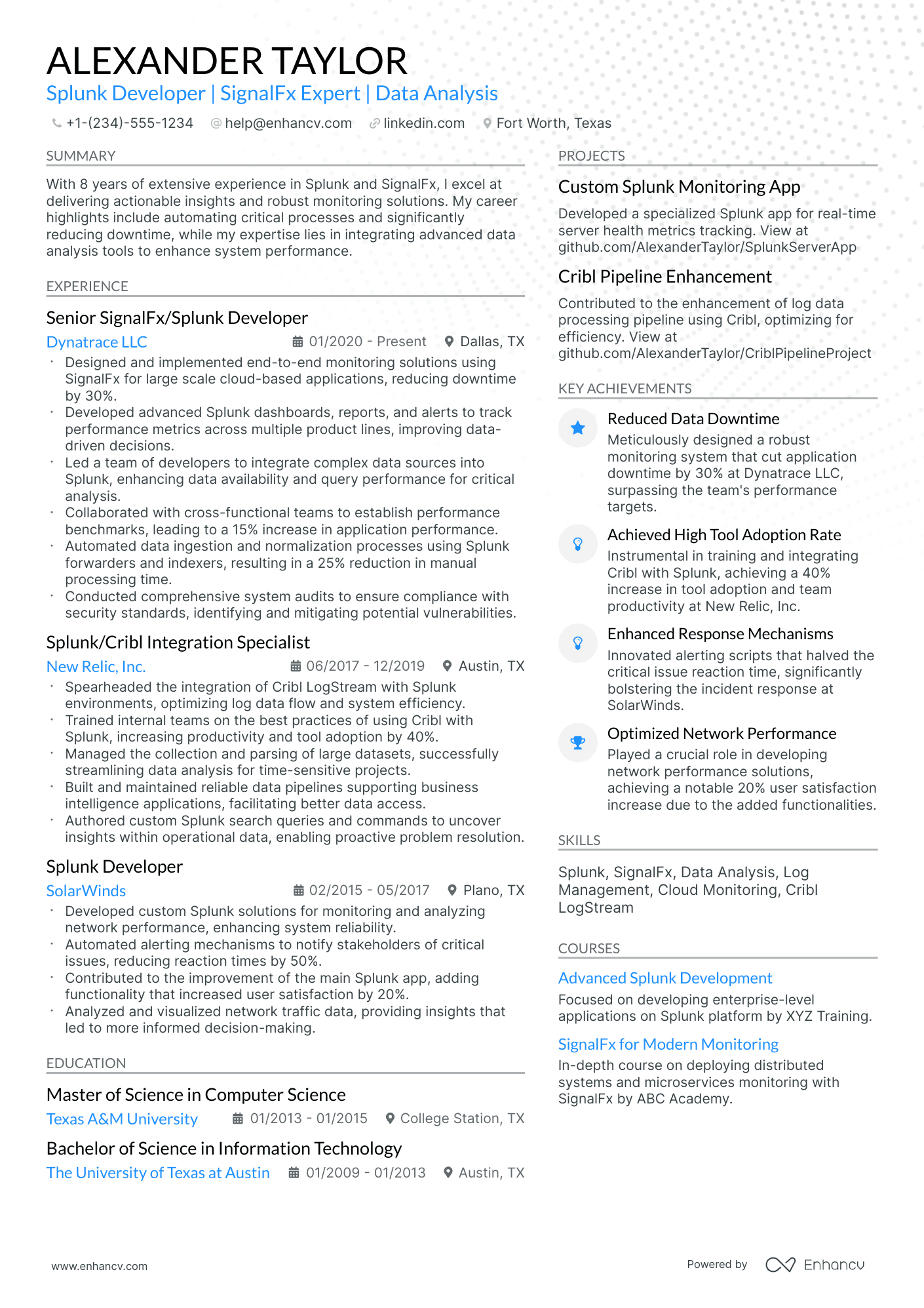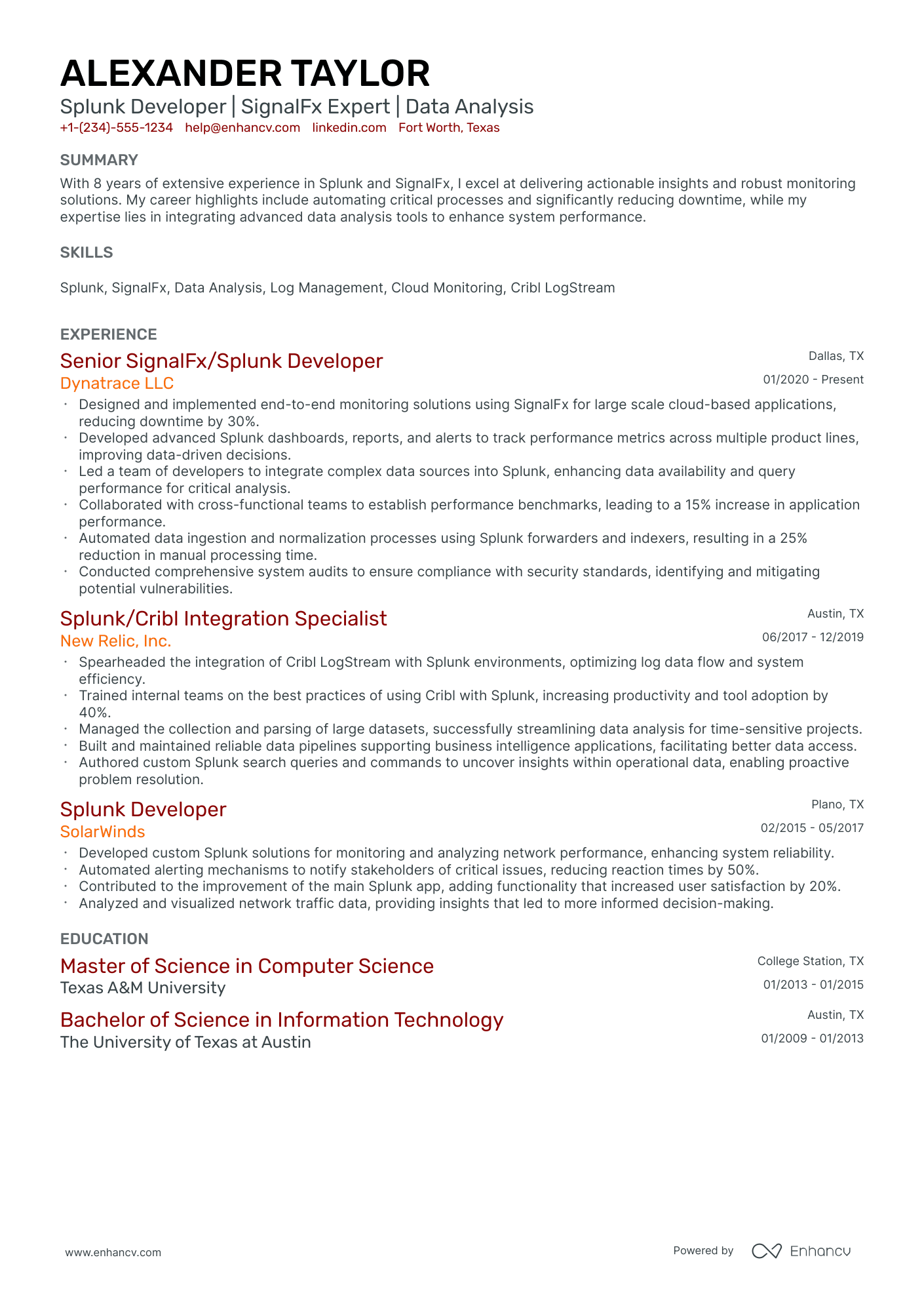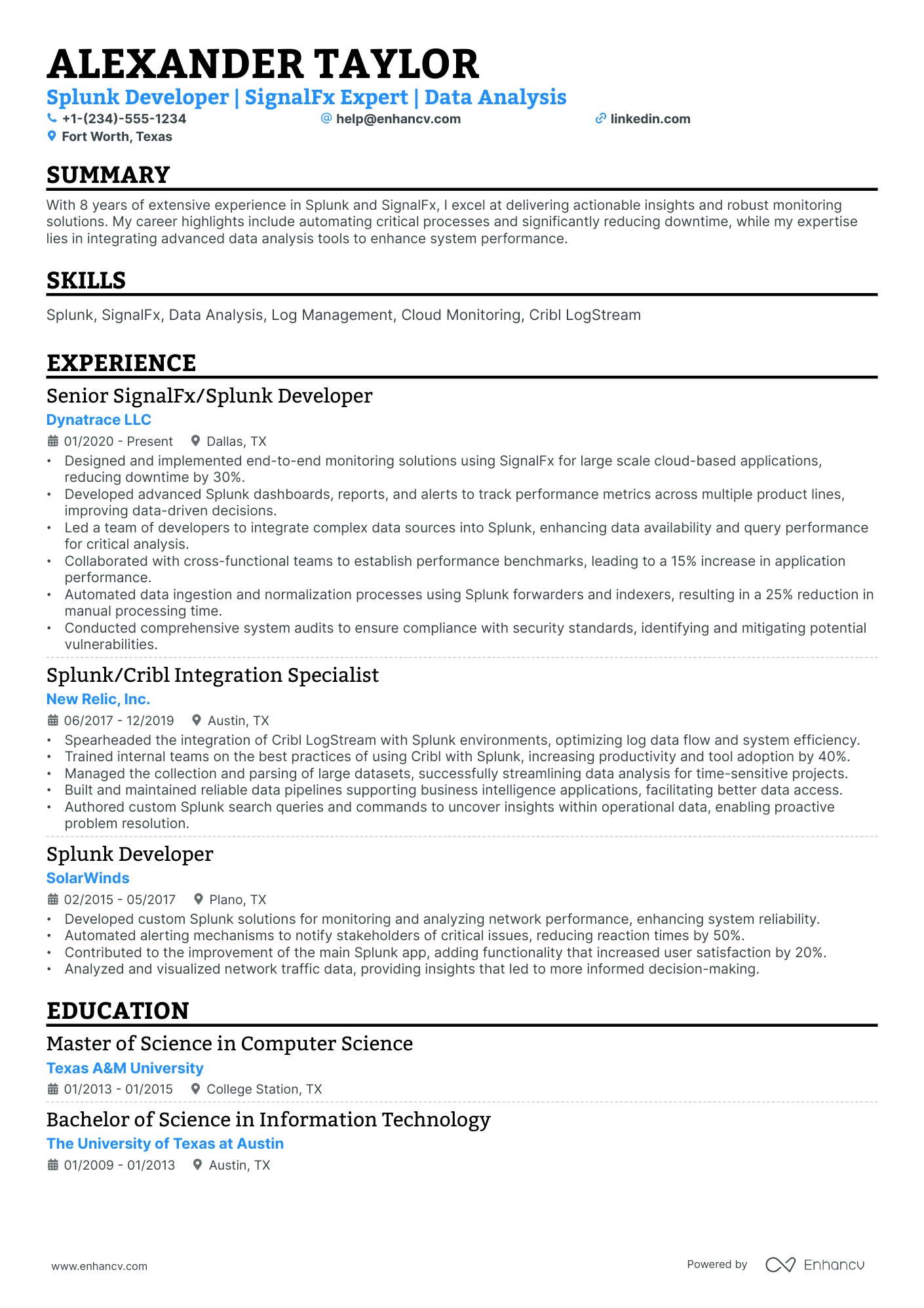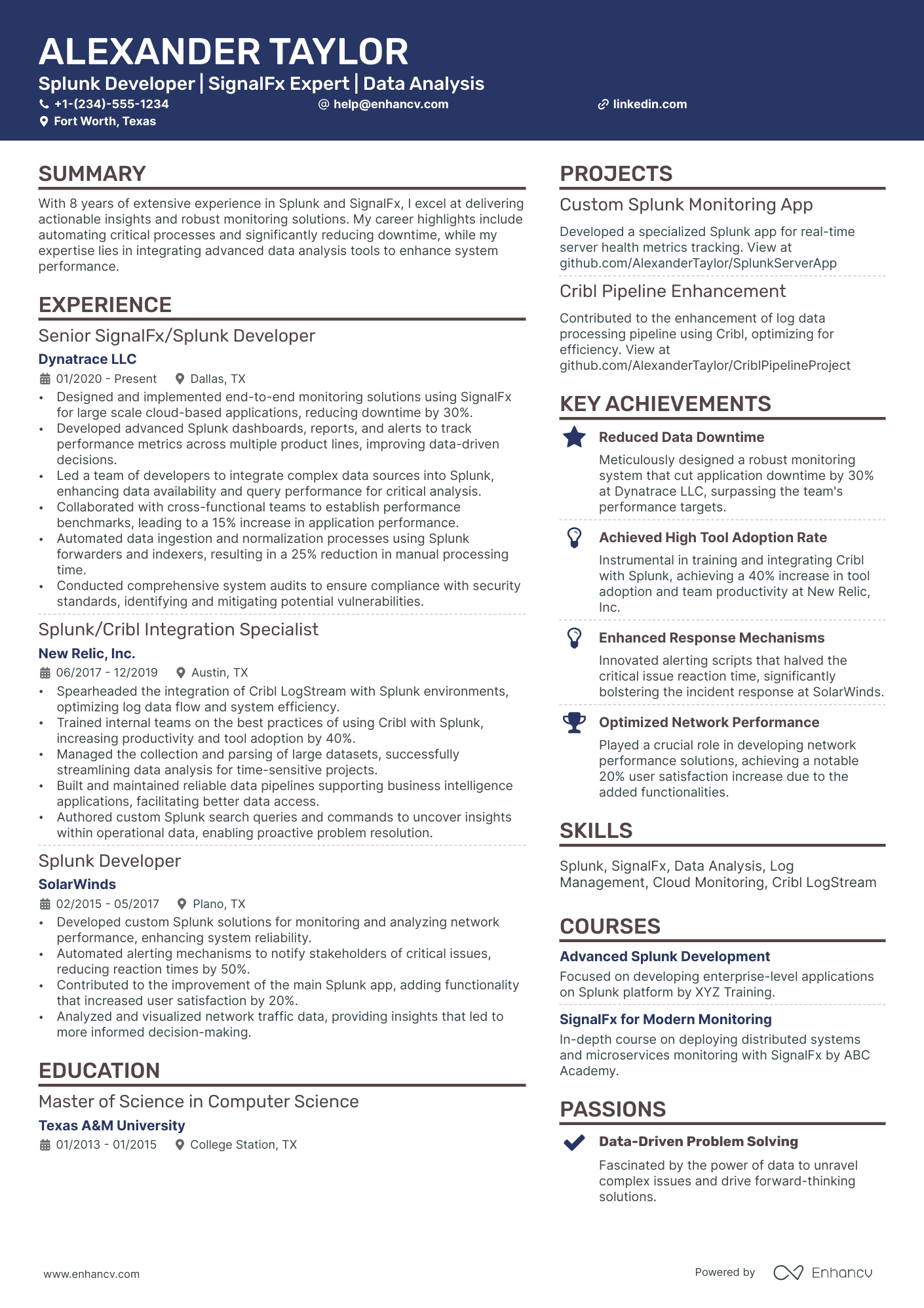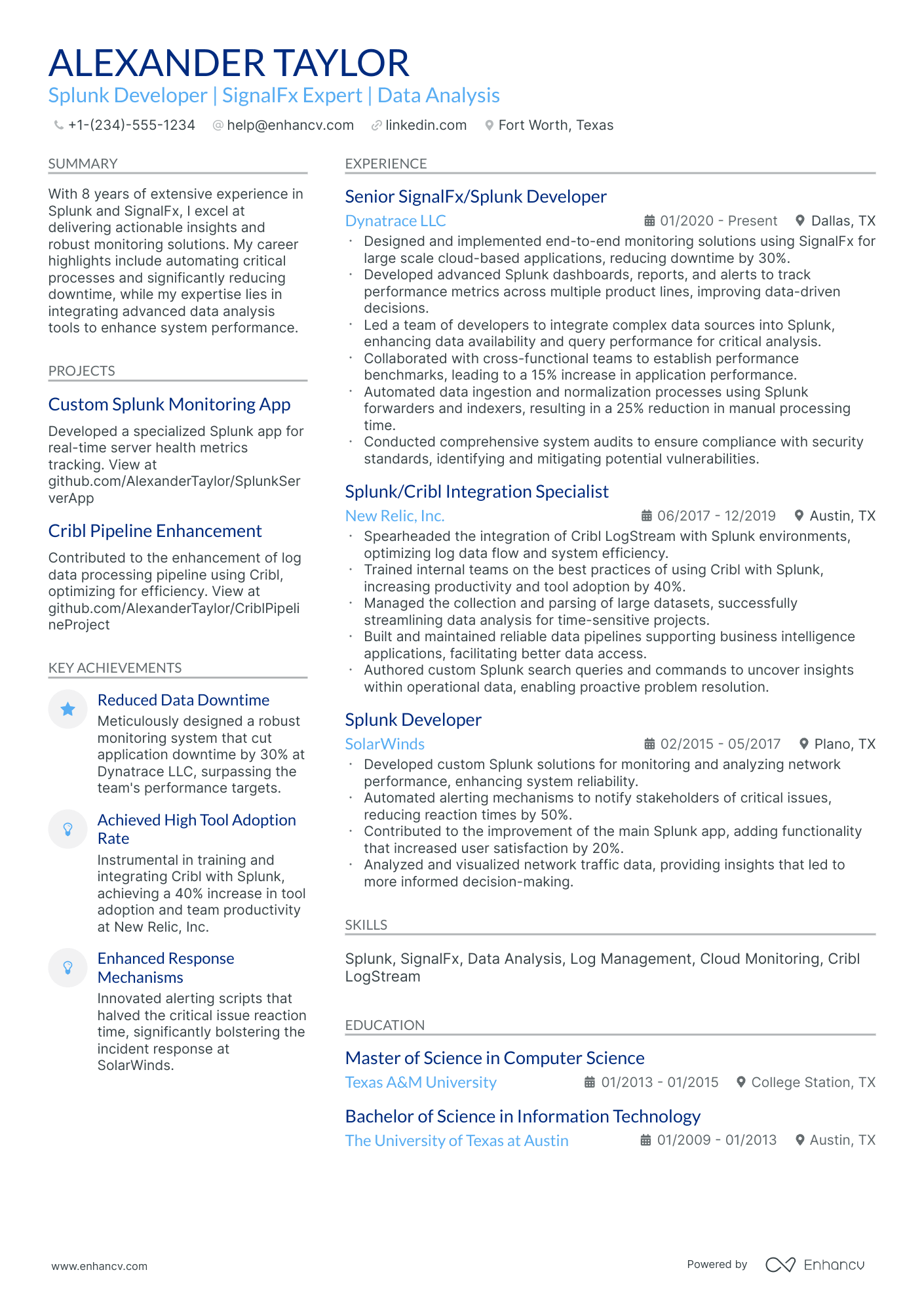Most Splunk developer resume drafts fail because they list search queries, dashboards, and add-ons without showing measurable impact. That hurts in ATS screening and fast recruiter scans, where competition is high and proof beats tooling.
A strong resume shows what you changed and why it mattered. Knowing how to make your resume stand out starts with highlighting reduced mean time to detect, faster incident triage, saved analyst hours, improved alert precision, shipped apps on schedule, supported terabytes per day, and strengthened compliance reporting.
Key takeaways
- Quantify every Splunk achievement with metrics like detection time, alert accuracy, or cost savings.
- Use reverse-chronological format for experienced candidates and hybrid format for career switchers.
- Tailor your experience bullets to mirror each job posting's exact tools and terminology.
- Demonstrate skills in context through your summary and experience, not just a standalone list.
- Build a home lab or GitHub portfolio to prove Splunk capability without formal job experience.
- Stack certifications like Splunk Core Certified Power User directly after your education section.
- Use Enhancv to turn vague job duties into measurable, recruiter-ready resume bullets faster.
How to format a Splunk developer resume
Recruiters evaluating Splunk developer candidates prioritize hands-on experience with Splunk Enterprise, SPL query development, dashboard creation, and data onboarding—alongside the ability to translate technical work into measurable operational outcomes. A clean, well-structured resume format ensures these signals surface quickly during both automated parsing and the initial recruiter scan.
I have significant experience in this role—which format should I use?
Use a reverse-chronological format to present your Splunk development experience in a clear, timeline-driven structure that highlights growing technical depth and project ownership. Do:
- Lead each role entry with your scope of ownership—number of indexes managed, data volume ingested daily, or environments supported across teams or business units.
- Feature role-specific tools and domains prominently: SPL, Splunk Enterprise Security, ITSI, HEC, forwarder management, dashboard XML/JSON development, and REST API integrations.
- Quantify outcomes tied to your work, such as reduced mean time to detect, improved search performance, or cost savings from optimized license usage.
I'm junior or switching into this role—what format works best?
Use a hybrid format that places a focused skills section above your experience timeline, giving recruiters immediate visibility into your Splunk competencies even if your work history is limited or transitional. Do:
- Position core Splunk skills—SPL, data parsing, field extractions, dashboard development, and forwarder configuration—in a dedicated section near the top of the resume.
- Highlight projects, lab environments, certifications (such as Splunk Core Certified Power User), or freelance work that demonstrates practical Splunk usage, even outside formal employment.
- Connect every listed skill to a specific action and a concrete result so recruiters see applied capability rather than keyword lists.
Why not use a functional resume?
A functional format strips away the timeline and context that recruiters need to evaluate how, where, and how recently you applied your Splunk skills, making it harder to verify real competency and easier for applicant tracking systems to misparse your experience. Avoid a functional format unless you have no other viable option for presenting your background.
- A functional resume may be acceptable if you're making a career change from a related field (such as systems administration or network engineering into Splunk development), have significant resume gaps, or lack formal Splunk job titles—but only if every listed skill is tied directly to a project, lab, or outcome that proves hands-on capability.
With your format establishing a clean, scannable structure, the next step is deciding which sections to include and how to order them for maximum impact.
What sections should go on a Splunk developer resume
Recruiters expect a Splunk developer resume to clearly show your ability to build, optimize, and maintain Splunk solutions that deliver measurable outcomes. Understanding which resume sections to include and how to order them is critical for making your qualifications easy to find.
Use this structure for maximum clarity:
- Header
- Summary
- Experience
- Skills
- Projects
- Education
- Certifications
- Optional sections: Open-source work, Publications, Leadership
Strong experience bullets should emphasize the Splunk use case, data scale, performance or reliability gains, security or compliance impact, and the business results you delivered.
Is your resume good enough?
Drop your resume here or choose a file. PDF & DOCX only. Max 2MB file size.
With your resume structure in place, the next step is to write the experience section in a way that supports those elements and makes your impact easy to assess.
How to write your Splunk developer resume experience
Your work experience section should spotlight the Splunk solutions you've shipped, the platforms and data pipelines you've built or maintained, and the measurable outcomes your work produced. Hiring managers prioritize demonstrated impact—faster search performance, improved data ingestion, stronger security posture—over descriptive task lists.
Each entry should include:
- Job title
- Company and location (or remote)
- Dates of employment (month and year)
Three to five concise bullet points showing what you owned, how you executed, and what outcomes you delivered:
- Ownership scope: the Splunk environments, apps, dashboards, data models, or infrastructure components you were directly accountable for—including the scale of data sources, indexes, or user populations they served.
- Execution approach: the specific tools, languages, and frameworks you relied on to deliver work, such as SPL, Splunk Enterprise Security, SOAR, Python scripting, REST APIs, deployment server configurations, or CI/CD pipelines for Splunk app development.
- Value improved: the changes your work drove in search performance, ingestion reliability, alert accuracy, dashboard load times, license utilization, system uptime, or overall observability coverage across the organization.
- Collaboration context: how you partnered with security analysts, site reliability engineers, IT operations teams, compliance stakeholders, or vendor support to define requirements, triage issues, and align Splunk capabilities with business needs.
- Impact delivered: the concrete results your contributions produced, framed through reduced mean time to detect or respond, expanded monitoring coverage, lowered infrastructure costs, or accelerated incident investigation—expressed as outcomes rather than activities.
Experience bullet formula
A Splunk developer experience example
✅ Right example - modern, quantified, specific.
Splunk Developer
Redwood Health Systems | Remote
2022–Present
Built and scaled Splunk observability and security analytics for a multi-tenant healthcare platform supporting two million monthly users.
- Developed Splunk Search Processing Language (SPL) detections and correlation searches mapped to MITRE ATT&CK, cutting mean time to detect by thirty-eight percent and improving true-positive rate by twenty-two percent.
- Built Splunk dashboards in Splunk Enterprise Security and Splunk IT Service Intelligence with drilldowns and service health scores, reducing incident triage time by forty-one percent for on-call engineers.
- Automated data onboarding with Splunk Universal Forwarder, HTTP Event Collector, and Splunk Add-on Builder, increasing ingestion reliability to 99.8 percent and eliminating eight hours per week of manual parsing fixes.
- Optimized search performance by refactoring SPL, tuning indexes, and standardizing data models with the Common Information Model, lowering average search runtime by thirty-four percent and reducing daily compute spend by twelve percent.
- Partnered with security, platform engineering, and product managers to define alert thresholds and runbooks in Jira and Confluence, decreasing Sev one incidents caused by noisy alerts by twenty-seven percent.
Now that you've seen how to structure strong experience entries, let's focus on aligning them with the specific requirements of the job you're targeting.
How to tailor your Splunk developer resume experience
Recruiters evaluate your Splunk developer resume through both human review and applicant tracking systems (ATS). Tailoring your resume to the job description ensures your qualifications register with both.
Ways to tailor your Splunk developer experience:
- Match the specific Splunk products and modules listed in the posting.
- Mirror the exact SPL commands or search techniques the role requires.
- Use the same terminology for data onboarding or ingestion pipelines referenced.
- Align your dashboard and visualization work with stated reporting needs.
- Highlight security monitoring or SIEM experience when the posting specifies it.
- Reference the deployment architecture or clustering model the employer uses.
- Include relevant compliance frameworks like HIPAA or PCI DSS if mentioned.
- Emphasize the same performance or uptime metrics the job description prioritizes.
Tailoring means aligning your real accomplishments with what the role demands, not forcing unrelated keywords into your experience.
Resume tailoring examples for Splunk developer
| Job description excerpt | Untailored | Tailored |
|---|---|---|
| Design and implement Splunk dashboards and alerts for real-time security monitoring across cloud and on-prem environments | Created dashboards and helped with monitoring tasks for the team. | Designed 15+ Splunk dashboards and configured real-time alerts to monitor security events across AWS and on-prem infrastructure, reducing mean time to detect threats by 40%. |
| Develop custom Splunk apps and add-ons using SPL, Python, and REST API integrations to ingest data from third-party sources | Worked on data integrations and wrote scripts for various projects. | Built three custom Splunk apps using SPL and Python, integrating REST APIs to ingest logs from ServiceNow, CrowdStrike, and Palo Alto Networks into a unified index handling 2 TB of daily data. |
| Collaborate with SOC analysts to optimize search performance, create knowledge objects, and maintain Splunk Enterprise Security (ES) deployment | Supported the security team and performed general system maintenance. | Partnered with a 12-person SOC team to tune correlation searches in Splunk Enterprise Security, built saved searches and macros that cut average query runtime from 45 seconds to under 10 seconds. |
Once you’ve aligned your experience with the role’s priorities, you should quantify your Splunk developer achievements to show the measurable impact of that work.
How to quantify your Splunk developer achievements
Quantifying your achievements proves business impact beyond "built dashboards." For Splunk developers, focus on search performance, alert reliability, data quality, security coverage, delivery speed, and cost savings across indexes, apps, and users.
Quantifying examples for Splunk developer
| Metric | Example |
|---|---|
| Search performance | "Reduced median SPL query runtime from 18s to 6s by rewriting joins, adding summary indexing, and tuning accelerated data models." |
| Alert reliability | "Cut false-positive alerts by 42% by adding suppression rules, refining thresholds, and validating correlation searches against thirty days of incident data." |
| Data quality | "Improved field extraction accuracy from 85% to 97% by updating props.conf and transforms.conf and standardizing sourcetypes across twelve log sources." |
| Security coverage | "Expanded detection coverage to twenty MITRE ATT&CK techniques by shipping fifteen correlation searches and mapping notable events in Splunk Enterprise Security." |
| Delivery speed | "Reduced dashboard release cycle from two weeks to five days by templating Simple XML, using Git workflows, and adding automated app packaging checks." |
Turn vague job duties into measurable, recruiter-ready resume bullets in seconds with Enhancv's Bullet Point Generator.
Once you've crafted strong, results-driven bullet points, you'll want to pair them with a well-organized skills section that highlights both your technical expertise and interpersonal strengths.
How to list your hard and soft skills on a Splunk developer resume
Your skills section shows recruiters and ATS (applicant tracking system) that you can build, optimize, and support Splunk apps and detections, and most resumes land best with a hard-skill-heavy mix supported by role-specific execution and collaboration skills. Splunk developer roles require a blend of:
- Product strategy and discovery skills: Translate stakeholder needs into dashboards, detections, and Splunk app requirements.
- Data, analytics, and experimentation skills: Model data, validate field extractions, and iterate using search results and performance metrics.
- Delivery, execution, and go-to-market discipline: Ship Splunk content with version control, testing, and release workflows.
- Soft skills: Partner with security, operations, and data teams to drive adoption and resolve incidents.
Your skills section should be:
- Scannable (bullet-style grouping).
- Relevant to the job post.
- Backed by proof in experience bullets.
- Updated with current tools.
Place your skills section:
- Above experience if you're junior or switching careers.
- Below experience if you're mid/senior with strong achievements.
Hard skills
- Splunk Enterprise, Splunk Cloud
- Search Processing Language (SPL)
- Splunk dashboards, reports, alerts
- Splunk app development (Simple XML)
- Splunk REST API, SDKs
- Data onboarding, sourcetypes, inputs.conf
- Field extractions, props.conf, transforms.conf
- Common Information Model (CIM) mapping
- Index design, retention, data models
- Performance tuning, search optimization
- Git, CI/CD pipelines
- Linux, Bash, Python
Listing specific hard skills like SPL, CIM mapping, and REST API integrations helps ATS systems match your profile to technical job requirements.
Soft skills
- Requirements discovery with stakeholders
- Translate use cases into SPL
- Prioritize backlog by impact
- Write clear runbooks and documentation
- Review searches and detections critically
- Communicate tradeoffs and constraints
- Coordinate releases with admins
- Triage issues using evidence
- Own incidents through resolution
- Collaborate with security and operations teams
- Manage scope and expectations
- Present findings to nontechnical audiences
How to show your Splunk developer skills in context
Skills shouldn't live only in a bulleted list on your resume. Explore resume skills examples to see how top candidates weave competencies throughout their applications.
They should be demonstrated in:
- Your summary (high-level professional identity)
- Your experience (proof through outcomes)
Here's what that looks like in practice.
Summary example
Senior Splunk developer with eight years of experience building enterprise monitoring solutions in financial services. Skilled in SPL, Python, and REST API integrations. Reduced mean incident response time by 42% through custom dashboards and automated alert frameworks for cross-functional operations teams.
- Reflects senior-level expertise clearly
- Names role-relevant tools and methods
- Includes a concrete performance metric
- Signals cross-functional collaboration skills
Experience example
Senior Splunk Developer
Bridgepoint Financial Technologies | Remote
March 2020–Present
- Built 15+ Splunk dashboards using SPL and XML, cutting mean detection time by 37% across three security operations teams.
- Partnered with DevOps engineers to automate log ingestion pipelines via Python and HEC, reducing manual data onboarding effort by 60%.
- Designed role-based access controls and CIM-compliant data models, supporting SOC analysts in achieving 99.5% compliance audit pass rates.
- Every bullet includes measurable proof.
- Skills appear naturally within achievements.
Once you’ve anchored your Splunk developer capabilities in real examples, the next step is applying that approach to a Splunk developer resume when you have no experience.
How do I write a Splunk developer resume with no experience
Even without full-time experience, you can demonstrate readiness through projects and self-directed learning. Our guide on writing a resume without work experience covers strategies that apply directly to Splunk developer candidates. Consider showcasing:
- Splunk developer home lab builds
- GitHub Splunk app code samples
- SPL dashboards from public datasets
- Splunk REST API integrations
- Splunk add-on data inputs
- CTF log analysis write-ups
- Open-source bug fixes and PRs
- Splunkbase app configuration projects
Focus on:
- SPL searches and data models
- Splunk app and add-on structure
- Data onboarding and parsing results
- Version control and CI evidence
Resume format tip for entry-level Splunk developer
Use a skills-first hybrid resume format because it highlights Splunk developer projects, labs, and GitHub work before limited job history. Do:
- Lead with a "Projects" section.
- Link to GitHub repos and READMEs.
- List SPL, Python, and REST APIs.
- Quantify data volume, latency, or errors.
- Include your Splunk developer environment setup.
- Built a Splunk developer home lab ingesting 2 GB/day syslog, wrote SPL dashboards and alerts, and cut mean detection time from twelve minutes to three.
Even without professional experience, your education section can demonstrate the technical foundation and relevant coursework that make you a strong Splunk developer candidate.
How to list your education on a Splunk developer resume
Your education section helps hiring teams confirm you have the foundational knowledge needed. It validates your technical background in areas like data analytics, computer science, or information systems relevant to the Splunk developer role.
Include:
- Degree name
- Institution
- Location
- Graduation year
- Relevant coursework (for juniors or entry-level candidates)
- Honors & GPA (if 3.5 or higher)
Skip month and day details—list the graduation year only.
Here's a strong education entry tailored for a Splunk developer resume.
Example education entry
Bachelor of Science in Computer Science
Georgia Institute of Technology, Atlanta, GA
Graduated 2021
GPA: 3.7/4.0
- Relevant coursework: Data Structures, Big Data Analytics, Network Security, Database Systems, and Systems Administration
- Honors: Dean's List (six semesters), Magna Cum Laude
How to list your certifications on a Splunk developer resume
Certifications on your resume show a Splunk developer's commitment to learning, hands-on tool proficiency, and industry relevance. They also signal you can follow structured training and apply best practices in production.
Include:
- Certificate name
- Issuing organization
- Year
- Optional: credential ID or URL
- List certifications below education when your degree is recent and more relevant than your credentials.
- List certifications above education when they're recent, role-specific, or more impressive than older education.
Best certifications for your Splunk developer resume
- Splunk Core Certified Power User
- Splunk Core Certified Advanced Power User
- Splunk Enterprise Certified Admin
- Splunk Enterprise Certified Architect
- Splunk SOAR Certified Automation Developer
- AWS Certified Developer – Associate
- Microsoft Certified: Azure Developer Associate
Once you’ve positioned your credentials where they’ll get noticed, move to your Splunk developer resume summary to reinforce that expertise upfront and set context for the rest of your resume.
How to write your Splunk developer resume summary
Your resume summary is the first thing a recruiter reads. A strong one instantly signals you're qualified for the Splunk developer role.
Keep it to three to four lines, with:
- Your title and total years of relevant experience.
- The domain or industry you've worked in, such as cybersecurity or IT operations.
- Core tools and technologies like Splunk Enterprise, SPL, Python, or REST APIs.
- One or two quantified achievements that show measurable impact.
- Soft skills tied to real outcomes, such as cross-team collaboration that shortened delivery cycles.
PRO TIP
At this level, focus on technical skills, specific tools you've used, and early contributions that moved the needle. Highlight hands-on work with SPL, dashboards, and data onboarding. Avoid vague phrases like "passionate learner" or "team player" without context. Replace them with concrete examples of what you built or improved.
Example summary for a Splunk developer
Splunk developer with two years of experience building dashboards and alerts for security operations. Reduced incident detection time by 30% through optimized SPL queries and automated data onboarding pipelines using Python.
Optimize your resume summary and objective for ATS
Drop your resume here or choose a file.
PDF & DOCX only. Max 2MB file size.
Now that your summary captures your Splunk expertise and value, make sure your header presents your contact details clearly so recruiters can actually reach you.
What to include in a Splunk developer resume header
A resume header is the top section with your identity and contact details, and it boosts visibility, credibility, and recruiter screening for a Splunk developer.
Essential resume header elements
- Full name
- Tailored job title and headline
- Location
- Phone number
- Professional email
- GitHub link
- Portfolio link
Including a LinkedIn link helps recruiters verify experience quickly and supports screening.
Do not include photos on a Splunk developer resume unless the role is explicitly front-facing or appearance-dependent.
Match your header job title to the posting and add a Splunk developer headline that reflects your core focus, such as app development or SPL.
Example
Splunk developer resume header
Jordan Lee
Splunk developer | Splunk apps, SPL, and REST API integrations
Austin, TX
(512) 555-01XX
jordan.lee@enhancv.com github.com/jordanlee yourwebsite.com linkedin.com/in/jordanlee
Once your contact details and role-specific branding are set at the top, add the following additional sections to strengthen your Splunk developer resume and provide supporting context.
Additional sections for Splunk developer resumes
When your core sections don't fully capture your expertise, additional sections help you stand out among other Splunk developer candidates. For example, listing language skills on your resume can be especially valuable if you work with global teams or multilingual log sources.
- Languages
- Certifications
- Publications and technical blog posts
- Conference presentations and speaking engagements
- Open-source contributions and Splunk app development
- Professional affiliations and community memberships
- Hobbies and interests
Once you've strengthened your resume with relevant additional sections, it's worth pairing it with a cover letter to give hiring managers even more context about your Splunk expertise.
Do Splunk developer resumes need a cover letter
A cover letter isn't required for a Splunk developer, but it helps in competitive roles or teams that expect one. If you're unsure where to start, understanding what a cover letter is and how it complements your resume can clarify when it's worth writing one. It can make a difference when your resume needs context, or when the hiring manager screens for product and stakeholder fit.
Use a cover letter to add details your Splunk developer resume can't show:
- Explain role and team fit: Match your experience to the team's stack, data sources, and delivery model.
- Highlight one or two outcomes: Name a dashboard, app, or integration you built, and include impact like reduced alert noise or faster triage.
- Show product and user understanding: Reference how Splunk users investigate, report, or respond, and how you designed for those workflows.
- Address transitions or non-obvious experience: Connect adjacent work to Splunk developer tasks, such as log onboarding, search performance, or security use cases.
Drop your resume here or choose a file.
PDF & DOCX only. Max 2MB file size.
Even if you decide a cover letter won’t add value for the role, using AI to improve your Splunk developer resume is the next step to strengthen your application efficiently.
Using AI to improve your Splunk developer resume
AI can sharpen your resume's clarity, structure, and impact. It helps tighten language and highlight relevant achievements. But overuse kills authenticity. Once your content is clear and role-aligned, step away from it. If you're curious about where to start, our guide on ChatGPT resume writing prompts offers practical examples you can adapt for Splunk developer resumes.
Here are 10 practical prompts to strengthen specific sections of your Splunk developer resume:
- Strengthen your summary: "Rewrite my resume summary to highlight my core value as a Splunk developer in two concise sentences."
- Quantify experience: "Add measurable outcomes to these Splunk developer experience bullets using metrics like time saved or incidents reduced."
- Tailor to a job posting: "Compare my Splunk developer resume to this job description and flag missing keywords or skills."
- Sharpen skills formatting: "Organize my Splunk developer skills section into clear categories like search languages, integrations, and dashboard tools."
- Improve project descriptions: "Rewrite this Splunk developer project description to emphasize scope, tools used, and business impact."
- Refine bullet structure: "Convert these Splunk developer experience paragraphs into action-driven bullet points starting with strong verbs."
- Align certifications: "Suggest how to present my Splunk developer certifications so they reinforce my target role."
- Trim redundancies: "Identify and remove repeated or filler phrases across my Splunk developer resume without losing meaning."
- Enhance education relevance: "Rewrite my education section to connect coursework and projects directly to Splunk developer responsibilities."
- Tighten language overall: "Shorten every sentence on my Splunk developer resume to under 20 words while keeping the original meaning."
Stop using AI once your resume sounds accurate, specific, and aligned with real experience. AI should never invent experience or inflate claims—if it didn't happen, it doesn't belong here.
Conclusion
A strong Splunk developer resume connects measurable outcomes to role-specific skills, like SPL, dashboards, alerts, data onboarding, and app development. It uses clear structure, consistent formatting, and focused bullets that show impact in numbers.
Hiring teams now want proof you can deliver reliable, secure, and scalable solutions. When your Splunk developer resume shows results, relevant skills, and clean organization, it signals you’re ready for today’s roles and the next hiring cycle.
